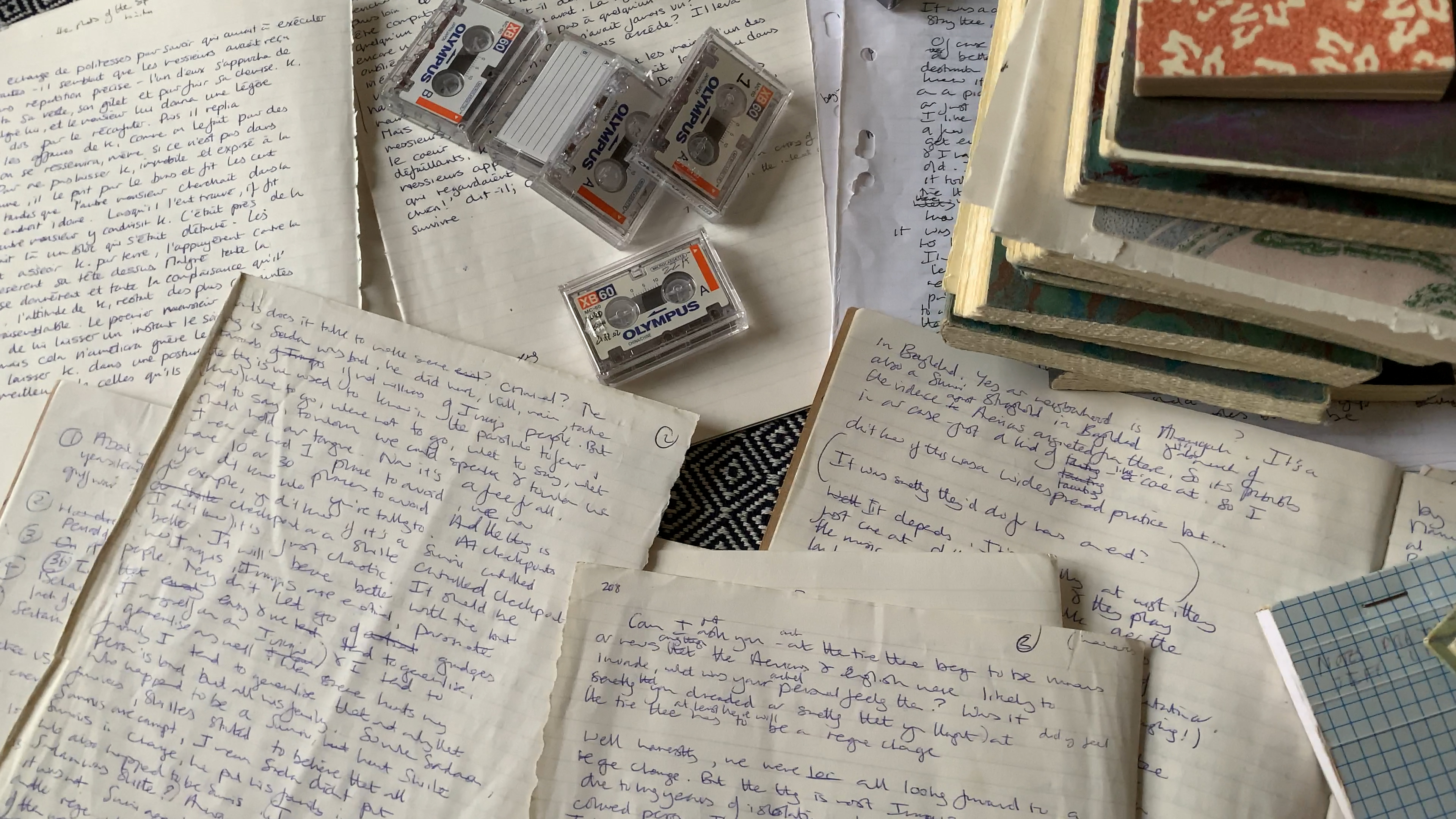
Excerpt Two from The Iraqi Suitcase
By Laura Waddington
First pages in Jordan:
*
My first day wandering through Amman, I get talking to a man smoking a cigarette on the balcony of a small art space. He is dressed all in white and has sad, intelligent eyes. He tells me that he has just arrived from Baghdad. When I mention that I make videos and he asks me to describe my latest one, he jumps up in excitement: “But I saw your film one night by chance, I’ve dreamt of your images! I have to introduce you to some of my Iraqi friends. Don’t worry, we’re going to look after you here!” The magic of filmmaking, Border has travelled ahead. I remember when I was making it, I promised myself that it would be a message in a bottle. His name is Bassam.
*
August evening. Bassam invites me to take a look at some of his work, his portrayal of Baghdad tender and very moving. I realise how much the images of Iraq on the Western news have acted as a wall, stopping my imagination from venturing further; the country a backdrop for weapons inspections and bombs and endless photo opportunities for Saddam Hussein. For the first time, I become aware of the intimate fabric of a city destroyed, traces of a place where men and women dreamed, had smoke-filled conversations, waited for things to change, lived as intensely as they could within the ever more narrow space for manoeuvre allotted to them.
After we go to eat in a small kebab shop with some of his friends. I am struck by the wide range of their knowledge as they excitedly crisscross back and forth between history, philosophy and Arab and Western literature, in a way that I have only experienced with people double my age in the West—an intellectual urgency. I chat with Samir, who comes from the South of Iraq near Babylon. He talks about his former job as a journalist in Baghdad, the impossibility of returning home due to death threats he has received because of his writing.
“Culture in Iraq now? Forget it!” says Bassam. “Everything you are seeing in your media is bullshit because before there was one Saddam, and now we have hundreds of Saddams with a different censorship and killing machines.”
*
The kindness of the men in the tiny store where I eat foul for breakfast. Every morning they blast Fairuz from a beaten-up CD player, like scores of restaurants, shops, and taxi drivers across the city. I wake up to the sound of some of my favourite songs: Zaali Tawal, Wahdon, Kifak Inta. She has the voice of an angel.
*
I spend the afternoon and evening with Bassam, dinner at Al Quds and later a drink in a small, deserted bar on Rainbow Street. He talks about his fascination for Federico Garcia Lorca’s essay on duende, the films of Yousry Nasrallah, and the poetry of W.B. Yeats. We laugh a lot.
“In three decades, Saddam destroyed the country. I watched the city turn into a village day by day. You can see it in the women. If you were to collect photos of women on the streets of Iraq from the nineteen seventies until now, you would begin with photos that could have come from Paris or Rome and then, year by year, things retreat into the dark ages. It’s horrible.
“Saddam came from Tikrit with his men and their countryside customs. Instead of exporting civilisation, they did the opposite. They controlled and forbade everything about city life which they didn’t like, such as freedom of speech and freedom of women. Day by day, they changed the three main cities, Mosul, Baghdad and Basra, into huge villages. It didn’t happen in one or two years; it took more than thirty-five years. It is one of the main problems but nobody talks about it. I saw it. I lived it.”
Walking home in the early hours, I think of the song in Lorca’s essay: “Inside the garden I shall surely die, inside the rosebush. They will kill me. Mother, Mother, I went out gathering roses. But surely death will find me in the Garden. . . .”
*
Not for a moment, Walt Whitman, lovely old man,
Have I failed to see your beard full of butterflies,
nor your corduroy shoulders frayed by the moon,
nor your thighs as pure as Apollo’s,
nor your voice like a column of ash,
old man, beautiful as the mist . . .
—Federico Garcia Lorca, “Ode to Walt Whitman”
Source
Waddington, Laura. Excerpt Two from the The Iraqi Suitcase. (Upcoming publication).
Back to top